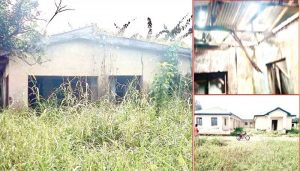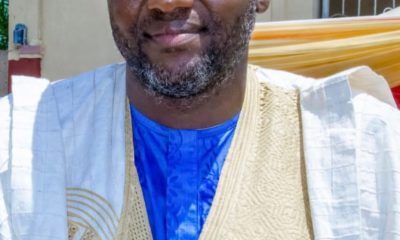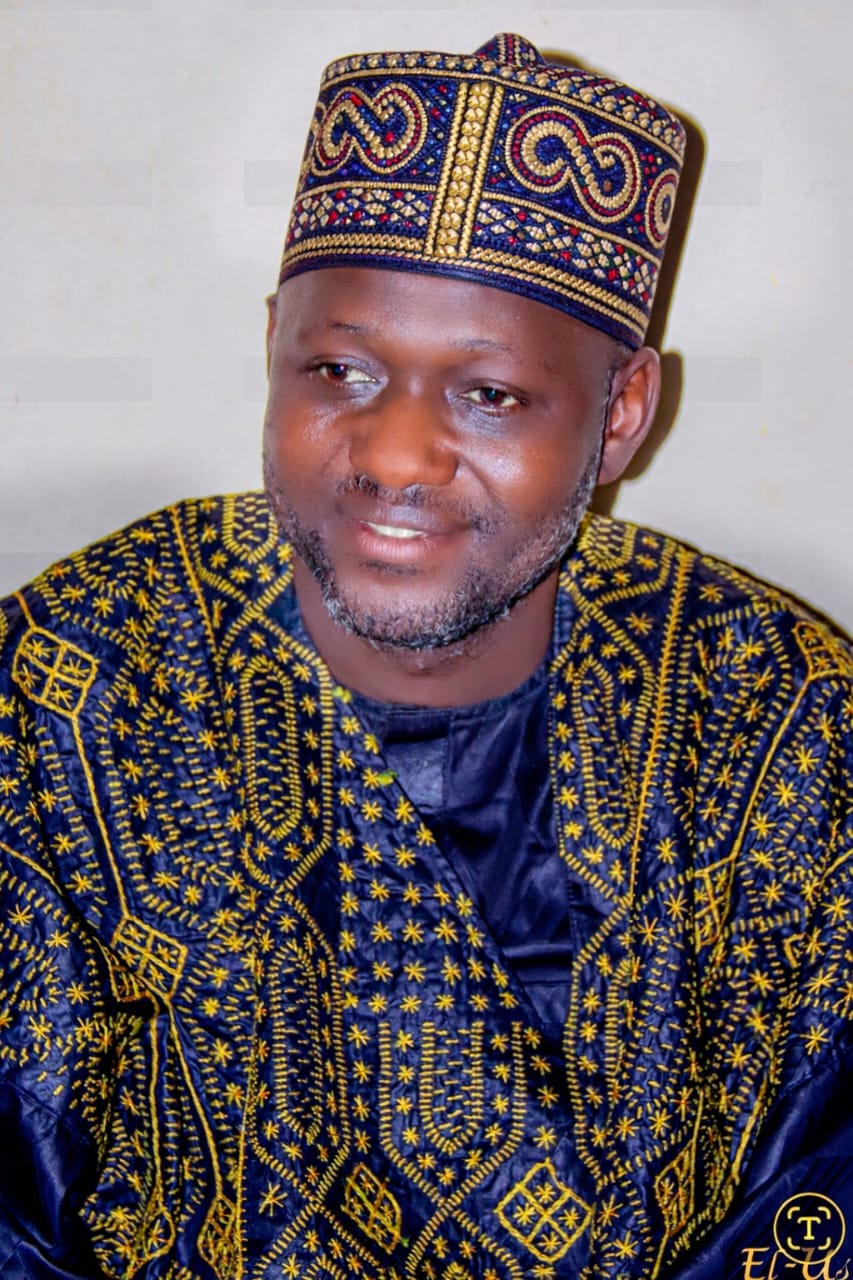society
Harvest of deaths: Ogun community where mothers, newborns die during childbirth
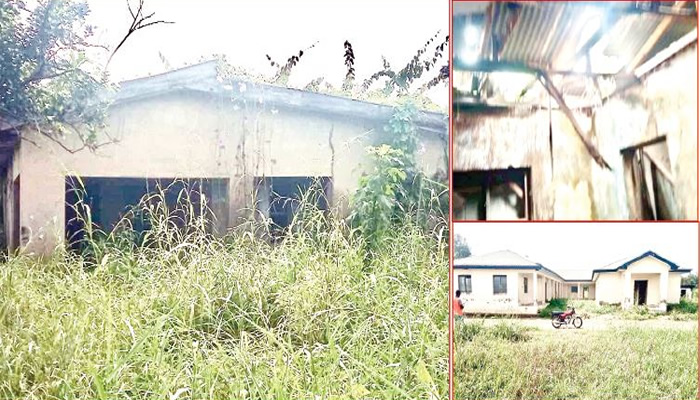
Harvest of deaths: Ogun community where mothers, newborns die during childbirth
In Igbokofi, a sleepy community nestled in the Yewa North Local Government of Ogun State, no functional healthcare facility exists, thus leading to high maternal and child mortality. SODIQ OJUROUNGBE writes on the harrowing experiences of residents, especially pregnant women and the high price they pay in this neglected enclave.
Behind the amazing greenery and quiet façade presented by Igbokofi, an agrarian community lays gloom, grief and deep-seethed anger that boil from being denied one of life’s fundamental rights – accessible healthcare.
Here, maternal and infant deaths appear to be a norm and a fate they have come to accept.
Governance, to Igbokofi’s residents, is just a mirage and one that happens in a faraway land.
The story of Tosin Ayeni breaks the heart because her death due to pregnancy-related complications was avoidable.
As she lay on a hard bed in a small, dark room that fateful night, all that this first-time mother (primigravida ) wanted was to cuddle her bundle of joy after going through the rigours of labour.
Drenched in sweat and shaking from the effects of excruciating pains travelling from her waist down to her legs, she looked at her husband with fear in her glazed eyes.
They would have rushed her to the nearest health centre had it not been abandoned years back by the state government and overtaken by thickets.
The nearest primary health centre to them is located in Ijoun, which is a two-hour ride on a motorcycle, on a rough, unmotorable road.
While another alternative, though shorter and could be life-threatening to a pregnant woman due to its mountainous layout is a hospital that can be annexed within 45 minutes in the Republic of Benin.
However, after considering the two options and realizing that they could be dangerous for Tosin, her husband, Sanjo and his father-in-law, Ayeni, had to make a last-minute decision to seek the assistance of a popular traditional birth attendant in the next community.
The elderly TBA after taking one look at the pregnant woman, told them she was in very bad shape and her life was in danger but assured them that she would try her best.
Sadly, the TBA skill was limited and could not do much without proper equipment.
After hours of groaning and grunting, she gave birth to a baby girl, but minutes later, life ebbed out of her.
As the family grieved, they also had to care for the newborn baby, who was a prototype of her later mother.
“I watched my wife suffer and then die. There was nothing I could do. She left a hole in my heart,” Sanjo said with bloodshot eyes.
Tosin’s father, PUNCH Healthwise learnt, never recovered from the death of his daughter.
And days turned into weeks, and rolled into months, overwhelmed by grief, Ayeni’s health deteriorated, and he became a shadow of his former self.
In early September of 2023, he slept and never woke up.
The deaths of Tosin and her father were just two among the long line of tragedies witnessed in the community.
Folakemi Olaniyi is yet to get over the death of her child after being mismanaged during childbirth in a private hospital.
According to her, she was later taken to Ijoun Primary Health Centre after her baby’s head and hands got stuck in the birth canal.
Olaniyi told our correspondent that she was referred to the Ayetoro General Hospital by the health workers when they realized that she had lost a large amount of blood.
The woman was later moved to Lantoro Hospital in Abeokuta, where a cesarean section was carried out to remove the baby, who had become distressed at the time.
“The doctors battled to save our lives but my baby did not survive. If the community had a working, well-equipped hospital, my baby would still be alive,” she cried.
However, PUNCH Healthwise learnt that Olaniyi not only lost her child, but she can no longer conceive as her womb was badly damaged due to a rupture during labour.
“I spent two months in the hospital. If there was a qualified government hospital here, I would have been attended to immediately.
“I have four children, and whenever they are sick, I take them to a health centre in Ijoun, which is very far, or to a hospital in Benin Republic. If there is no money, they are treated with herbs. The government should please provide the community with a hospital.
Another resident, Bernice Ogunyomi, said she always takes her child, who requires regular blood transfusions to the Republic of Benin for treatment.
She lamented that even the health centre in Ijoun could not attend to her child’s medical needs.
Expressing her frustration, She lamented, “Whenever we take our children there (Benin Republic), we pay through our nose. Many people have no choice but to go to Benin Republic for treatment, and as for me, my priority is to get good treatment.”
A community without primary healthcare
PUNCH Healthwise learnt that Igbokofi, a town with about 9,000 people, which borders the Republic of Benin, has witnessed decades of deaths, while residents face an uncertain future.
Some of the villages under Igbokofi are Bode-Igbokofi, OkeEyo-Igbokofi, Omilende-Igbokofi, Asaga-Igbokofi, Idigbo-Igbokofi, Owode-Igbokofi, Ipinle-Igbokofi, Igbonla-Igbokofi, Oosada-Igbokofi, Baginiwo, OriOke, among others.
Most of the residents told our correspondent that the death of Tosin and her father did not come as a surprise to them because such happens often.
They claimed that they have lost of the number of people that have died from preventable diseases and childbirth-related complications due to the absence of a primary health centre.
Maternal/infant death is a norm
PUNCH Healthwise investigation revealed that pregnant women and their unborn infants are at serious risk due to a lack of healthcare facilities and the absence of competent healthcare providers.
Speaking with our correspondent, a field missionary to Ohori Nations, and the proprietor of Christ Way Academy in Igbokofi, Pastor Kunle Garb, said the community once had a government hospital, which was eventually shut down due to a lack of health workers and government failure to provide necessary amenities.
He revealed that another hospital constructed by the National Boundary Commission, and handed over to the Ogun State government was never put to use, lamenting that residents now deal with high rates of maternal and child mortality.
Tortuous road
For Igbokofi residents, the lack of a functional health centre is just part of the many challenges they are faced with as the community lacks other infrastructure like good roads, electricity and potable water.
Accessing the place from Ayetoro, a major town, was treacherous.
The main artery leading to the community was unpaved and narrow and often became impassable during the rainy season.
PUNCH Healthwise observed that the road was uneven and lined with deep potholes filled with murky water.
Travelling on the road, our correspondent observed, would be dangerous for pregnant women or those in need of urgent medical care.
The residents told PUNCH Healthwise that they have over the years lost many of their loved ones while transporting them to the health centre in Ijoun.
They described the road as a source of great frustration and appealed to the state government to intervene.
Garb, who is also one of the community leaders in Igbokofi said during the last campaign, the state government promised to repair the road leading to the community as well as other roads, and lamented that the indifference to their suffering after the election is mind-blowing
“Despite being a community of about 7,000 registered voters, we have not felt any evidence of good governance.
“The only time we see any government official is during election season when they come to the village to make empty promises.
“But after the elections, they would disappear, leaving the people of Igbokofi to fend for themselves.
“The lack of government support is a major factor in the community. Without access to education or healthcare, many people will struggle to find jobs or improve their living conditions.
“Without proper roads, we are isolated from the outside world and can’t access markets or other opportunities. The cycle of poverty will be difficult to break. The people of Igbokofi feel trapped,” “ he blurted in anger.
Child deaths high in Ogun
According to the United Nations Children’s Fund infant and under-five mortality rates have remained steady in Nigeria, at 74 and 117 deaths per 1,000 live births, respectively.
UNICEF noted that at these mortality levels, one Nigerian child of every 13 born dies before reaching age one, while one in every eight does not survive to their fifth birthday.
Meanwhile, a UNICEF report released in 2022, revealed that Ogun State recorded the highest number of children’s deaths in the southwestern part of the country.
The survey conducted by the Nigeria Bureau of Statistics in collaboration with UNICEF and other partners indicated that Ogun recorded the highest figures in neonatal mortality, infant mortality, and postnatal care for newborns, among others in the region.
The Social Policy Specialist of UNICEF, Mohammed Okorie, while speaking on this at a two-day media dialogue on the 2022 Multiple Indicator Clusters, explained that the estimations were “part of the MICS 6 results released by the NBS on August 16, 2022.”
Quoting the NBS, he said, the survey estimated that 56 out of 1000 children between the ages of zero and 11 months died after birth in Ogun State.
Okorie stated further that 68 out of 1000 children between the ages of 0 and less than one year died after their birth in Ogun State.
He noted that the state has also ranked the highest in deaths of children under five years with a record of 85 deaths out of 1000 children.
He further said that Ogun also recorded the lowest newborn care with an estimation of 77 per cent.
According to the World Health Organisation, as of 2017, Nigeria’s maternal mortality rate was estimated at 917 per 100 000 live births and increased by nearly 14 per cent in 2020 to reach 1047 deaths.
Ogun State Government refused to save us – Community leader
Corroborating this data, the acting Baale of the community, Pa Jacob Ogunyomi stated that in the last two years, childbirth complications claimed the lives of about five pregnant women, while more than 20 children have died before they clock five.
He said several letters have been written to the government highlighting the community’s dire predicament, but none of them have been treated as urgent or important.
“The greatest challenge we have is that we don’t have a hospital, those that were working have been abandoned and were later closed.
“When we try to patronise private hospitals, we don’t get good medical treatment and they are very expensive. The other option we have is to take those who are sick and pregnant women to Ijoun, which is a two-hour journey from Igbokofi.
“The government should provide a good hospital, health workers, and a motorable road. One of the issues is that whenever they transfer new health workers here, they will stop coming because of the bad road. If there are good roads, then it will be better,” he explained in smattering English.
Hospital built by National Boundary Commission rots
PUNCH Healthwise further gathered that a health facility built by the National Boundary Commission in 2010 was abandoned.
Our correspondent learnt that it the commission handed over a five-in-one project which included a hospital, school, market, police station, and workshop to the state government.
However, while the market, police station, and school were put to use by the residents, the hospital was shut despite the state government being aware that one of the main reasons for building the hospital was to curb the high rates of maternal and child mortality recorded in the community.
During PUNCH Healthwise visit, it was observed that the building was already falling apart, while the paints had practically washed off, revealing just bare cement.
It was clear that no one had set foot in the building for years.
The residents said the hospital was built to bring healthcare closer to them but that the aim was never actualised.
While inspecting the abandoned hospital, our correspondent discovered that the damage went beyond the peeling paints and broken windows, as it was discovered that the floorboards were rotting.
Ambulance taken away
Garb told our correspondent that some of the burglaries had been stolen.
He said, “The last time government officials came was the day the Boundary Commission came to hand these properties to them. They did not do anything since then. The ambulance that was handed over to the government with the name of Igbokofi inscribed on it was taken away that same day.
“The hospital was never equipped and the building was left to rot since 2010, and nothing has been done about it. Several efforts to get the attention of the government have not yielded any positive response.”
Corroborating Garb’s claims, some residents claimed the state government took away an ambulance donated by the Boundary Commission and gave it to the Ayetoro General Hospital.
They accused the state government of turning a blind eye to their plight and exposing them to needless deaths.
The residents insisted that the Toyota Hilux ambulance would have been a lifesaver, as it would have been used to transport sick people to the nearest hospital within minutes.
They also claimed it was taken away because there was no intention to equip the hospital or provide an alternative one – a primary health centre in the community.
They lamented that in the absence of an ambulance, they use other crude means to transport the sick and injured, and in most cases pregnant women to the Ayetoro General Hospital.
Dilapidated primary healthcare
PUNCH Healthwise observed that the only Ogun State Primary Health Centre in Igbokofi is overgrown with weeds, and according to the residents, it stands as a stark testament to years of indifference.
Garb told our correspondent that the health centre, which serves about 16 villages around Igbokofi, was shut down 12 years ago because of the bad road.
“The hospital was closed down 12 years ago and people left in the hands of quacks who claim to be doctors.
“People have died due to lack of health facilities in the community and around. Even the Ijoun community that we usually rush to doesn’t have a well-equipped primary health centre. It is just so unfortunate.”
Left in the hands of quacks
Residents of Igbokofi revealed that they are forced to rely on traditional healers and quacks who operate private clinics, lamenting that they do more harm than good.
A Cocoa farmer and resident of Igbokofi, Ogunyomi Benjamin, said they prescribed drugs without proper medical tests.
He said, “My wife gave birth at home, and that is the same for others here. Most women give birth by themselves at home, and this has resulted in many deaths because there is no doctor to take care of them.
“Also, when our people get sick, we don’t have anywhere to take them for treatment and many of our women have died from being prescribed the wrong medications after childbirth.
“It is only God that is taking care of our children because there is no hospital and no qualified doctor. We just mix several drugs and give them to take. God is the only one helping us.
“We want the government to give us a good general hospital and they should put enough drugs there for us to use, with a qualified doctor.”
Quacks contribute to high maternal and child mortality
A study titled, ‘The Impact of Quackery and Unreliable Health Facilities on Maternal and Child Mortality in Nigeria’ by Dr Abibat Fakunle of the University of Ilorin Teaching Hospital, found that lack of trained healthcare professionals and unreliable health facilities are major factors contributing to high maternal and child mortality in the country.
The study discovered that the prevalence of quackery in the healthcare sector was a major factor contributing to high maternal and child mortality.
While describing quacks as unqualified or untrained individuals who practice medicine without proper training or certification, the study noted that such people often provide substandard or even harmful care, leading to poor outcomes for patients.
The study found that this practice was common in rural areas, where access to qualified healthcare professionals is limited. It also found that many patients were unaware of the risks of seeking care from unqualified practitioners.
The study recommended increased funding and regulation of the healthcare sector to ensure that quality healthcare is available to all Nigerians.
According to a gynecologist and reproductive health expert at Federal Medical Centre, Idi-Aba, Abeokuta, Dr. Adetola Olayinka, quackery and inadequate healthcare facilities are major factors contributing to maternal and child mortality in Nigeria
He, however, pointed out that quackery is not the only factor contributing to maternal and child mortality, adding that environmental factors such as poor sanitation, lack of access to clean water, and exposure to toxins can also have a major impact on health outcomes.
Healthcare is every Nigerian’s right – Physician
The medical practitioner underscored the importance of access to qualified healthcare professionals and the need for better regulation of the healthcare sector.
“Healthcare is a right, not a privilege. All Nigerians, regardless of their socioeconomic status, deserve access to quality healthcare. I call on the government to invest in healthcare facilities, train and retain qualified healthcare professionals, and regulate the healthcare sector to ensure that the people are protected from quackery.
“Poverty and poor health go hand in hand. Children who live in poverty are more likely to suffer from malnutrition, which can lead to lifelong health problems. We must do more to address the underlying causes of poverty and improve access to basic needs like health,” he noted.
Govt keeps mum
When our correspondent reached out to Lekan Adeniran, the Chief Press Secretary to Governor Dapo Abiodun, he was directed to the Commissioner for Health, Dr. Tomi Coker.
However, the commissioner’s number was not reachable but four messages sent to her WhatsApp indicated that they were read.
When our correspondent reached out again to the governor’s CPS, Adeniran, he was told to either go to the commissioner’s office or wait for the commissioner’s response.
society
Ooni’s Ojaja Pan Africa redeems ₦9.2Billion SEC Regulated Public Debt Market, commits to economic stability

Ooni’s Ojaja Pan Africa redeems ₦9.2Billion SEC Regulated Public Debt Market, commits to economic stability
The Ojaja Pan Africa Limited owned by, His Imperial Majesty, Ooni Adeyeye Enitan Ogunwusi, Ojaja II, CFR, the Ooni of Ife, recently completed the seamless redemption of its inaugural Commercial Paper (CP) issuance, amounting to an impressive ₦9.2 billion. This achievement sends a powerful message about Ojaja Pan Africa’s strong liquidity and unwavering creditworthiness, making waves throughout Nigeria’s financial landscape.
The funds were raised as part of a duly registered ₦10 billion programme on the FMDQ Securities Exchange. Ojaja Pan Africa fulfilled its entire obligation with remarkable efficiency, fully repaying ₦2.15 billion from Series 1, maturing on 21 November 2025, and ₦6.91 billion from Series 2, maturing on 20 February 2026, utilizing resources generated internally. This accomplishment is especially noteworthy against the backdrop of Nigeria’s challenging economic environment, where the Central Bank’s Monetary Policy Rate currently stands at a high 27 percent, rendering short-term borrowing prohibitively expensive for many corporations.
“The timely redemption of our Series 2 Commercial Paper, following the successful repayment of our maiden Series 1, stands as a powerful testament to the stability of Ojaja Pan Africa’s balance sheet and the rigor of our financial planning,” expressed Dr. Ayobami Oyedare, Acting Managing Director of Ojaja Pan Africa Limited. “By meeting these obligations in full, we have validated the trust placed in us by the investing public. With both maturities now successfully resolved, we are strategically focused on leveraging the remaining resources from our ₦10 billion programme to foster significant growth and expansion opportunities across the continent.”
The successful issuance and redemption were expertly handled by Comercio Partners Capital Limited, who acted as Lead Financial Advisers and Arranger. Mr. Stephen Osho, CEO of Comercio Partners, described the transaction as a defining moment for Ojaja Pan Africa. “The flawless execution of this redemption underscores the company’s exceptional operational capabilities and solid balance sheet integrity in the marketplace. Achieving this success amidst the intense pressures of the current economic tightening cycle illustrates the company’s capacity to not only weather challenges but to thrive in such conditions.”
This financial milestone represents just one chapter in Ooni Ogunwusi’s broader narrative of nation-building and economic innovation. Far from a mere ceremonial figurehead, the Ooni is a dynamic visionary with over 25 years of entrepreneurial acumen. As the Chairman and Group Chief Executive of Ojaja Pan Africa, he has transformed the conglomerate into an economic powerhouse, creating opportunities for tens of thousands of individuals across Nigeria while actively pursuing expansion initiatives throughout Africa. The company’s diverse portfolio exemplifies a blueprint for modern African economic development, encompassing ventures in real estate, hospitality, agriculture, education, manufacturing, and tourism.
Ooni Ogunwusi’s industrial vision is actively reshaping Nigeria’s economic canvas. In a landmark move for the country’s tourism industry, he signed a Memorandum of Understanding with the Nigerian Tourism Development Authority (NTDA) in February 2026, earning him the distinguished title of Grand Patron of Tourism. Through Ojaja Pan Africa, he is channeling private capital, leveraging diaspora networks, and utilizing cultural expertise to enhance heritage sites, cuisine, and hospitality infrastructure, all aimed at diversifying Nigeria’s economy away from oil dependency and positioning the nation as a premier global cultural destination.
A prime example of his innovative philosophy is the recent launch of OJAJA Soft Drinks, a proudly Nigerian beverage line crafted entirely from local, natural ingredients such as kola nut, ginger, lime, and lemon, along with an array of indigenous flavors. Designed to offer a healthier alternative to imported beverage giants, this brand not only empowers local farmers but also creates sustainable value chains for young entrepreneurs, vigorously pursuing the goal of import substitution. “It has always been my dream to build a powerful brand that embodies the essence of Africa, one that emerges from our vibrant continent and secures a prominent position on the global stage. My passion for educational excellence inspired me to establish Ojaja University in both Ilorin and Ile-Ife, with the aim of enhancing the quality of education and empowering the next generation of entrepreneurs.”Ooni Adeyeye declared.
Ooni further reemphasised his huge commitment to agricultural development using it as a tool for youth empowerment and development. He created the in and out growers scheme to enhance the youth cocoa revolution Eight years ago. “I personally gave three million cocoa seedlings to youths scattered across the country to help them expand their horizon and also rejig their interest in farming as a tool for development and economic stability. Today, those youths are reaping the rewards of their hard work with bountiful harvest.” Ooni further stressed that his focus for the youth is not merely on cultivating cocoa; but he is more dedicated to reshaping the industry by prioritizing local production over the export of raw cocoa beans. “By processing these beans domestically, we aim to create jobs for more youths and conserve foreign exchange for Nigeria, particularly in the chocolate and beverage markets. These impactful initiatives have garnered significant attention, with coverage from respected media outlets such as CNN and Al Jazeera.” We are not just cultivating cocoa; we are sowing the seeds for a sustainable future for our youth, one that showcases the rich potential of our continent to the world.” Ooni said.
The vision of a self-sufficient, industrious Nigeria is vividly manifested at Ojaja Mall, the largest and most innovative shopping destination in the country. Located in Lekki, Lagos, this massive AI-powered commercial hub features world-class retail arcades, modern cinema experiences, office spaces, an MSME centre, and various entertainment zones. Officially opened with grand celebrations, this landmark project is already generating thousands of direct and indirect jobs, invigorating local commerce, and setting a new standard for smart retail in Africa.
From championing Made-in-Nigeria products within his palace to facilitating youth empowerment initiatives through the House of Oduduwa Foundation, Oba Adeyeye Enitan Ogunwusi is committed to the principles of unity and progress. He is a staunch advocate for collective contributions to national development, regularly blessing the land for peace and prosperity, and fostering a vision of a transformed Nigeria driven by innovation, resilience, and entrepreneurial spirit.
society
Veteran Journalist, APC Stalwart Ibrahim Dahiru Danfulani Declares Bid for Kaduna Publicity Secretary Role
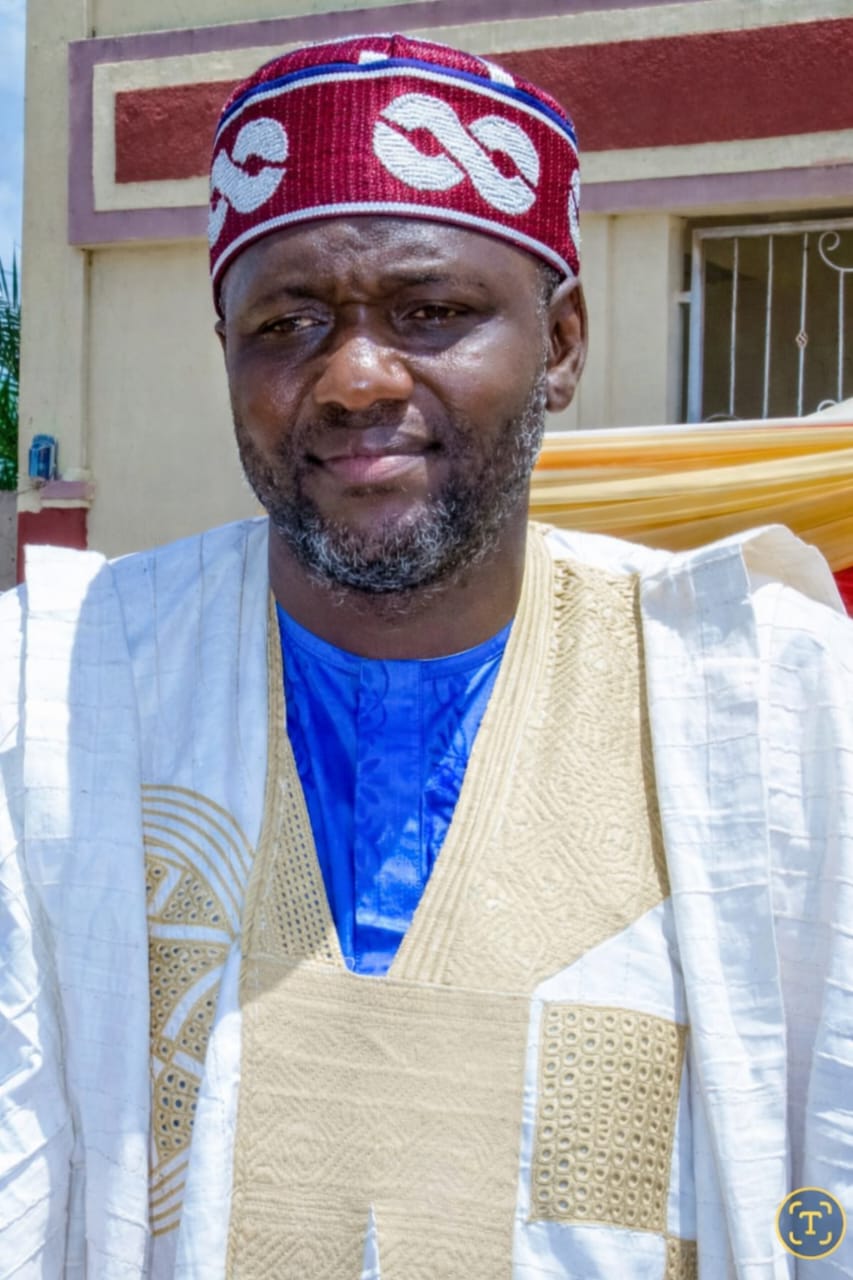
*Veteran Journalist, APC Stalwart Ibrahim Dahiru Danfulani Declares Bid for Kaduna Publicity Secretary Role*
In a significant development within the ruling All Progressives Congress (APC) in Kaduna State, a seasoned politician and media professional, Ibrahim Dahiru Danfulani, has formally declared his intention to contest for the position of State Publicity Secretary.
The declaration, made in an open letter addressed to the party leadership, members, and the general public, outlines a candidacy built on what Danfulani terms a “unique dual-pillar foundation.” He brings to the table over two decades of active political involvement as a founding member of the APC, coupled with an equivalent span of experience in journalism and strategic communication.
In his statement, Danfulani emphasized that his decision is “rooted in a lifelong commitment to progressive politics and a deep-seated passion for effective communication, public engagement, and party building.” He highlighted his journey with the party “from inception,” underscoring his status as a loyal stakeholder.
Detailing his qualifications, Danfulani stated that his extensive political acumen ensures he understands “the intricacies, the grassroots dynamics, and the strategic vision required to advance a party’s agenda.” He positions this as complementary to his professional expertise, noting that his journalistic career has equipped him with the skills “to craft compelling narratives, manage public perception, engage with diverse audiences, and deliver messages with clarity, integrity, and impact.”
The aspirant outlined a clear mission for the office, pledging to bring “professionalism, energy, and strategic communication” to the party’s operations. Key capacities he promises to deploy include articulating party policies and vision, amplifying the party’s voice, innovating publicity strategies, and fostering transparency to enhance the party’s image in Kaduna State.
“I am stepping forward with a clear mission,” Danfulani declared, seeking “support, trust, and mandate” from party delegates. He concluded with a call to collective action: “Together, let us build a louder, prouder, and more cohesive APC in Kaduna State.”
The contest for the publicity secretary role is expected to be keenly watched, as the office is crucial for managing the party’s narrative, especially in the dynamic political landscape of Kaduna State. Danfulani’s entry, with his blended background, sets the stage for a competitive party election.
*Long Live the All Progressives Congress!*
*Long Live Kaduna State!*
society
*TO: THE GENERAL PUBLIC, CITIZENS, AND FOLLOWERS OF THE UNITED KINGDOM OF ATLANTIS* *FROM: OFFICE OF THE SPOKESPERSON TO HIS ROYAL EMPEROR
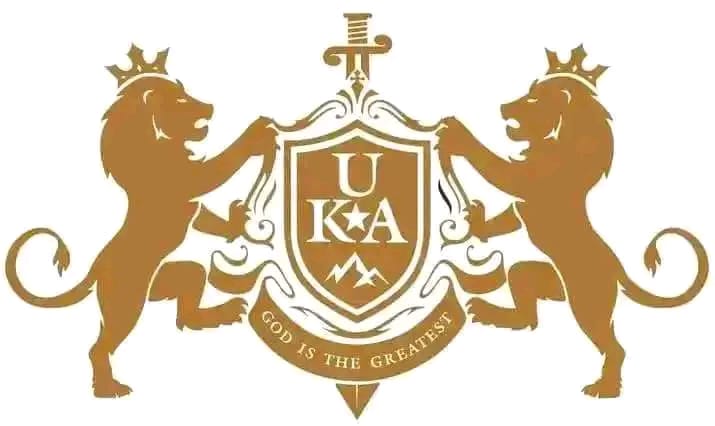
*TO: THE GENERAL PUBLIC, CITIZENS, AND FOLLOWERS OF THE UNITED KINGDOM OF ATLANTIS*
*FROM: OFFICE OF THE SPOKESPERSON TO HIS ROYAL EMPEROR*
*SUBJECT: PUBLIC NOTICE ON DEFAMATORY STATEMENTS*
The Office of the Spokesperson to His Royal Emperor wishes to inform and caution the public regarding the circulation of defamatory statements, voice notes, and publications alleging involvement of His Royal Emperor and the Government of the United Kingdom of Atlantis in fraudulent or criminal activities.
These allegations are *false, malicious, and without factual basis*. They are part of a calculated attempt to undermine the reputation of the UKA and its leadership, and to sow discord among its citizens and supporters.
The public is strongly advised to disregard such claims, intended to mislead, incite distrust, and disrupt the nation’s peace and progress. The UKA has always conducted its affairs with transparency, integrity, and accountability, and will continue to do so.
While upholding the right to lawful expression, the Throne will not tolerate:
– Deliberate defamation
– Character assassination
– Spread of harmful misinformation
The UKA has a zero-tolerance policy towards false and malicious allegations, and will take all necessary steps to protect its reputation and the rights of its citizens. Legal measures will be pursued against individuals or groups propagating these falsehoods, including but not limited to:
– Civil lawsuits for damages
– Criminal prosecution for defamation and cybercrime
– Other remedies available under national and international law
The Throne appreciates the loyalty and support of citizens, partners, and followers of the UKA and ATC Project. Your support is vital to achieving our shared vision of *growth, unity, and prosperity*.
The Throne remains committed to:
– Transparency
– Justice
– Well-being of all
We will continue to work tirelessly to promote the interests of the UKA and its people, and to build a brighter future for all.
*Signed:*
Spokesperson to His Royal Emperor
-

 celebrity radar - gossips6 months ago
celebrity radar - gossips6 months agoWhy Babangida’s Hilltop Home Became Nigeria’s Political “Mecca”
-

 society5 months ago
society5 months agoReligion: Africa’s Oldest Weapon of Enslavement and the Forgotten Truth
-

 society6 months ago
society6 months agoPower is a Loan, Not a Possession: The Sacred Duty of Planting People
-

 news6 months ago
news6 months agoTHE APPOINTMENT OF WASIU AYINDE BY THE FEDERAL GOVERNMENT AS AN AMBASSADOR SOUNDS EMBARRASSING

